The Best On-Premise ERP Software
In an era dominated by cloud subscriptions, we wrote this guide to the best on-premise ERP software through firsthand testing and research. Read our reviews below.
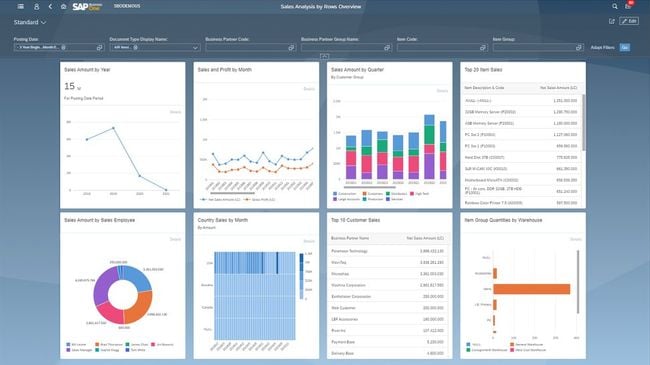
- Highly customizable
- Improved decision-making capabilities via extensive BI
- Multi-currency/multi-language support
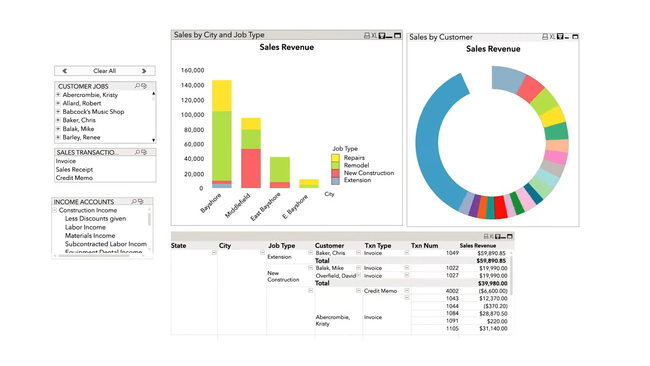
- More advanced inventory features than other QuickBooks versions
- Higher record capacity than other QuickBooks versions
- Includes payroll and employee management
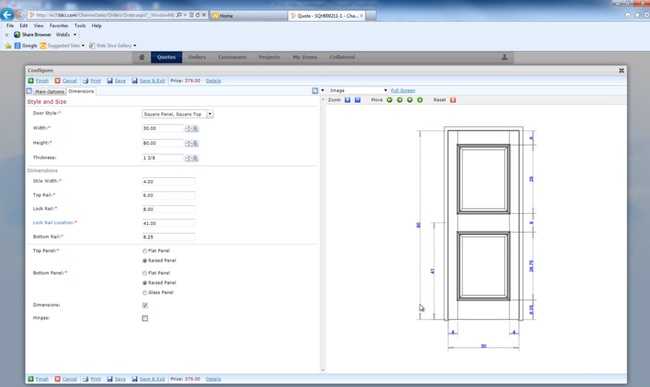
- Multi-site and multi-company support
- Built-in business intelligence
- Comprehensive supply chain management
On-premise ERP is software installed on local, company-owned servers instead of deployed through the cloud. In a time where cloud-based solutions dominate, finding genuine on-premise options is increasingly difficult.
Our comprehensive research and testing cut through the noise, ensuring that every system listed here truly operates within your own infrastructure. These are our top recommendations:
- SAP Business One: Best Overall
- Quickbooks Desktop Enterprise: Best Accounting Tools
- Infor CloudSuite: Best for Lean Manufacturers
- TallyPrime: Best Reporting Tools
- Sage 100 Contractor: Best for Construction
- AccountEdge: An Affordable Option
- Advantive ERP: Best for Distribution
- MIP Fund Accounting: Best for Nonprofits
- AccountMate: Best for Project Accounting
- Global Shop Solutions: Best for Discrete Manufacturers
- Executive Series: Best for Multi-Entity Accounting
SAP Business One - Best Overall
SAP Business One’s on-premise ERP software is ideal for businesses of all sizes, though it it remains popular with small to mid-sized businesses. In fact, most companies using SAP have between 10 and 99 employees, though some can reach up to 500.
As an organization expands, it can easily add new features, modules, and users to the system, supporting continuous growth. While Business One provides a solid foundation of core business functions, it also supports industry-specific solutions developed by SAP partners. These include different sectors like manufacturing, retail, professional services, and distribution.
SAP Business One offers extensive customizability options through the Software Development Kit (SDK). However, it’s generally more expensive than other ERP systems. Upfront license costs and ongoing maintenance fees make Business One pricier, especially for very small companies.
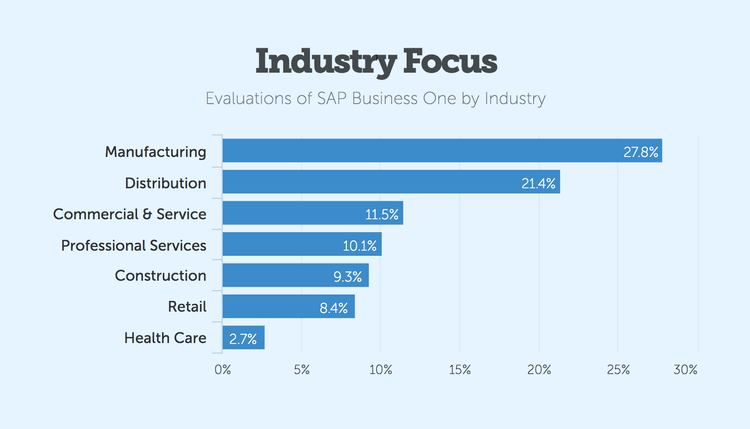
Quickbooks Desktop Enterprise - Best Accounting Tools
QuickBooks Desktop Enterprise includes over 120 built-in reports, including forecast vs. actual budget, statement of cash flows, profit and loss, and A/R aging detail. Additionally, we appreciate that QuickBooks Enterprise allows accountants to customize reports and consolidate them for multi-location companies.
Serviceable as a light ERP system, Enterprise is Intuit’s most advanced platform under the QuickBooks brand. It offers core financials like general ledger, accounts receivable, accounts payables, and fixed asset tracking. However, it exceeds QuickBooks Online’s basic capabilities, delivering advanced inventory management and payroll processing tools.
The on-premises version of Enterprise is only compatible with Windows systems. Mac and Linux users will need to look elsewhere for a truly on-premise ERP system.
Infor CloudSuite - Best for Lean Manufacturers
Infor CloudSuite Industrial, formerly Infor SyteLine, is one of the top on-premise picks for lean manufacturers. It enhances agility and minimizes waste through specialized features like the material planner workbench. This tool analyzes supply and demand across all warehouses and creates orders when inventory drops below safety stock levels.
With the Material Planner Workbench, it’s easy to convert material requirements directly into purchase orders and jobs. It also helps manage vendor selection, planned orders, and order quantities to reduce load times and excess inventory. Overall, the ERP system is adept at supply chain management, accounting, quality assurance, and advanced planning and scheduling.
CloudSuite Industrial is designed with smart functionality, so manufacturers need less customization and a shorter implementation period. However, Infor is increasingly shifting toward cloud-based solutions, potentially phasing out the on-premise version in the future.
TallyPrime - Best Reporting Tools
TallyPrime’s accounting system includes comprehensive reporting capabilities. The reporting engine allows you to filter, sort, and drill down into specific segments. Depending on your specific needs, you can view these in ledger format, columnar view, or detailed breakdown formats. Reports include:
- Balance Sheet: Tracks liabilities, assets, and capital in real time.
- Profit & Loss Statement: Shows expenses, income, and net profitability.
- Variance Reports: Compares budgeted vs. actual expenses to help you control spending.
- Ledger Reports: Summarizes all bank and cash transactions, including withdrawals and deposits.
- Bills Receivables and Payables: Track outstanding invoices and payment due dates.
Although TallyPrime is an on-premise ERP, it provides remote access to reports from any device using a web browser. The Silver plan starts at $81/month for a single user and is best suited for small, growing businesses that need support for multiple currencies.
Sage 100 Contractor - Best for Construction
Sage 100 Contractor is an on-premise ERP system for construction and contracting businesses. It’s usually the next logical step for companies that have outgrown QuickBooks Online, providing more advanced functionality tailored to the industry. Sage 100 Contractor includes databases for electrical and plumbing contractors, with over 33,000 electrical parts and 45,000 plumbing and mechanical parts.
As an ERP system, Sage 100 Contractor handles accounting, project management, estimating, and service management. We found its specialized billing module especially useful for contractors, covering AIA, unitary, time and materials, progress, and service billing.
Sage 100 Contractor isn’t the most scalable pick, though. It has far fewer integration options than competitors, with just 25 to QuickBooks Enterprise’s support for over 200. This might not be a problem for companies wanting to rely on just one ERP system for multiple processes.
AccountEdge - An Affordable Option
The AccountEdge Pro plan offers local desktop installation and starts at just $20 a month, supporting one user. The software is compatible with both Windows and Mac operating systems and provides a 30-day free trial.
AccountEdge covers a range of features, such as contact management, sales, inventory tracking, and time billing. All plans include email support. However, companies needing phone support must either sign up for the AccountEdge Hosted plan or subscribe to the telephone support add-on. Last, payroll functionality is only available as an add-on at $20/month for unlimited employees.
Advantive ERP - Best for Distribution
Inform ERP, also known as Advantive ERP, is a strong pick for distribution businesses. Its on-premise deployment allows distributors to run the system on their own servers for faster response times and better data security. Its advanced inventory management tool gives users quick access to on-demand kit modifications, assembly options, and de-kitting.
Inform ERP has an embedded CRM tool with detailed customer data, including interaction logs and purchase history. This is ideal for distributors handling a wide range of products and a large client base. It even includes eCommerce functionality, providing a customizable website with ERP-integrated inventory availability.
On the other hand, users find third-party app integrations challenging. Additionally, they reported navigation is sometimes difficult, particularly when accessing features buried deep within menus.
MIP Fund Accounting - Best for Nonprofits
MIP Fund Accounting supports nonprofits and government agencies through its detailed fund accounting. It allows organizations to report on and manage different funds based on specific grant requirements and restrictions. MIP also tracks grant-related finances and has advanced reporting capabilities compliant with FASB and GASB standards.
This on-premise ERP system handles complex indirect costs and investment allocations well. It also offers advanced calculation options and aligns with OMB Cost Principles. However, some users found migrating their data from the on-premise version to the cloud cumbersome and expensive.
AccountMate - Best for Project Accounting
AccountMate Enterprise is best for smaller businesses in architecture, engineering, and financial services. Overall, AccountMate Enterprise integrates project management with accounting, ensuring all time entries, expenses, and revenues are directly reflected in financial statements.
The Enterprise solution supports flexible billing and invoicing capabilities with various billing arrangements like fixed fees, time and materials, and milestone billing. It also enables detailed budgeting at the project or task level and helps forecast revenues, costs, and cash flows.
While AccountMate handles payroll, the system lacks a human resources module. This could be a problem for companies looking for training course management or employee self-service portals. However, the absence of built-in HR capabilities is not uncommon among many ERP platforms.
Global Shop Solutions - Best for Discrete Manufacturers
Global Shop Solutions is strong on-premises software for discrete manufacturers. It enables resource and material planning with job lead time estimates and generates accurate sales quotes and production schedules. Global Shop Solutions also helps discrete manufacturers with shop management, including material review and performance measurement for equipment and work centers.
The user interface is somewhat traditional, and navigation sometimes requires several clicks. However, this on-premise ERP boasts advanced search functionality. It allows users to locate parts and sub-components quickly. Last, Global Shop Solutions has granular time tracking for better overhead tracking and cost evaluation.
Executive Series - Best for Multi-Entity Accounting
SBT Executive Series lets users manage hundreds of companies without needing to log out of one business and log into another. It also supports over 150 currencies and multiple currency rate types.
Executive Series includes a Customization Manager with unlimited detailed history for broad historical analysis across different entities. It also features consolidated reporting, which can run hundreds of standard reports across individual or multiple companies.
What Is On-Premise ERP?
On-premise ERP refers to enterprise resource planning software installed and maintained on the client’s hardware and infrastructure, rather than being hosted on a remote server or cloud platform.
The organization fully controls the software with on-premise ERP, including customization, configuration, and security. They are responsible for maintaining the hardware, software updates, backups, and security protocols. Additionally, access is typically restricted to users within the organization’s network.
While on-premise options offer greater control and customization options, they also require a hefty upfront investment in hardware, software licenses, and IT resources. Upgrades and updates may also incur additional costs and downtime for implementation.
On-premise deployment is the route to go for companies wanting complete control over their data. However, it may not be as flexible or scalable as cloud-based ERP, which offers lower initial costs, easier scalability, and accessibility from anywhere with an internet connection.
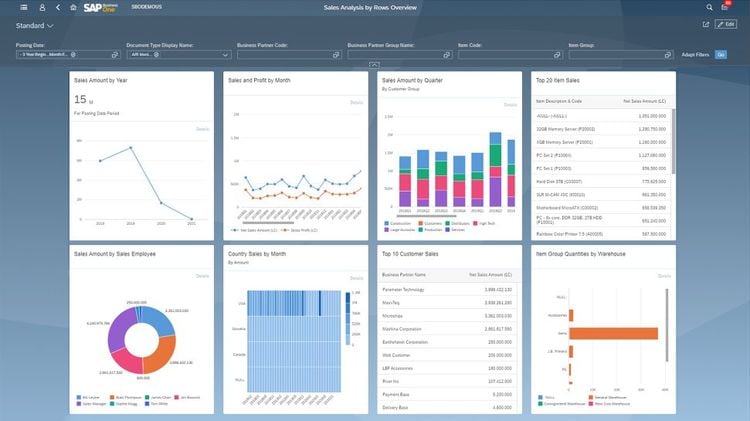
Benefits
On-premise ERP systems offer many benefits, starting with ownership. They’re generally provided through a perpetual license, though a few require ongoing maintenance or upkeep costs. Instead of making monthly or annual payments, companies implementing an on-premise ERP make a one-time payment. While it’s a lot upfront compared to SaaS ERP, a perpetual license can have a lower total cost of ownership than a subscription after only eight years of use.
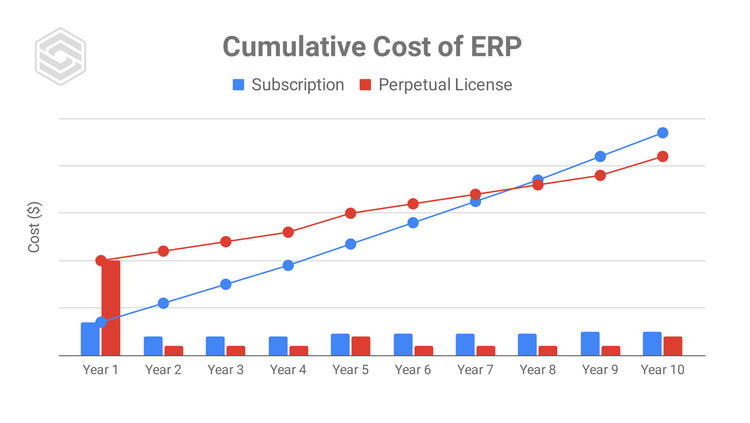
Hosting an ERP on local servers means more control over important company data, as everything is stored on local servers rather than in a third-party cloud. This can result in better security as long as IT stays on top of patches and other maintenance.
Since the system is restricted to local servers, it depends on local IT support. Businesses can hire their own technicians who understand company processes when making repairs or updates. These technicians won’t try to upsell additional services like a vendor-sent technician might.
Vendors can’t change on-premise solutions after the fact, so any releases on new versions won’t impact current systems. Cloud-hosted systems can potentially update to an entirely unrecognizable user interface with no way to revert back. Some on-prem applications can even operate offline, allowing uninterrupted work without an internet connection.
Private and Developer-Hosted Cloud ERP
Of course, it’s important to mention that on-premise ERP can be converted to private or developer-hosted cloud systems later. Private cloud ERP systems offer businesses several unique advantages, combining the best on-prem control with the increased functionality of developer-hosted cloud services.
Private cloud ERP has a significantly higher ownership cost than on-prem and developer-hosted systems. It may also require a third party to manage the infrastructure, making it not much different from a public, developer cloud.
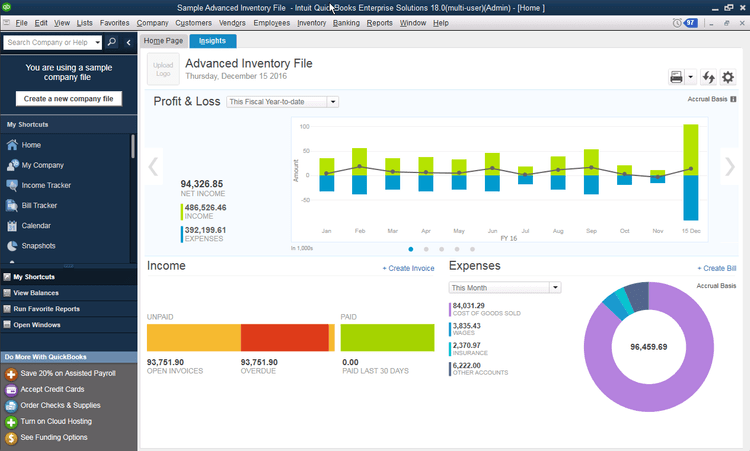
Drawbacks
For all its benefits, there are a few drawbacks to consider before implementing an on-premise ERP system:
- Higher IT costs: Since the ERP must be maintained locally, businesses may need to hire an IT specialist, increasing payroll. And there’s no guarantee of access to future updates, which may improve performance and security. At least not without making additional payments to the vendor.
- Reduced accessibility: Users of on-prem software can’t always log in from any web browser the way they could with a cloud-based system. This can limit business opportunities when traveling or attending meetings.
- More migration costs: If a business decides to switch to a private or developer cloud-based in the future, the necessary changes can be costly. Data migration alone will be pricey, not to mention installing any new hardware to meet compatibility requirements.
- Harder to integrate: Many businesses utilize multiple software products to operate as efficiently as possible. Integrating an on-premise ERP with out-of-the-box software can be difficult if those systems are cloud-based or from another provider.
Is On-Premise Right for Your Business?
To know which is best for your business, it’s important to fully understand the differences between on-premise and cloud-based software. One keeps data secure and close; the other offers more opportunities for updates and growth. At the end of the day, there are undeniable benefits to both on-premise and cloud-based ERP systems.
To determine if on-prem is right for your business, you need to consider several factors:
- Size of organization
- Number of users
- Potential growth
- Industry standards
- Budgetary restrictions
- Customization needs
For example, a global enterprise might not want an on-premise ERP because it can limit growth opportunities. Yet some businesses might need to use an on-prem solution to keep data as secure as possible.
Request free ERP software recommendations from the advisors at Software Connect for assistance.
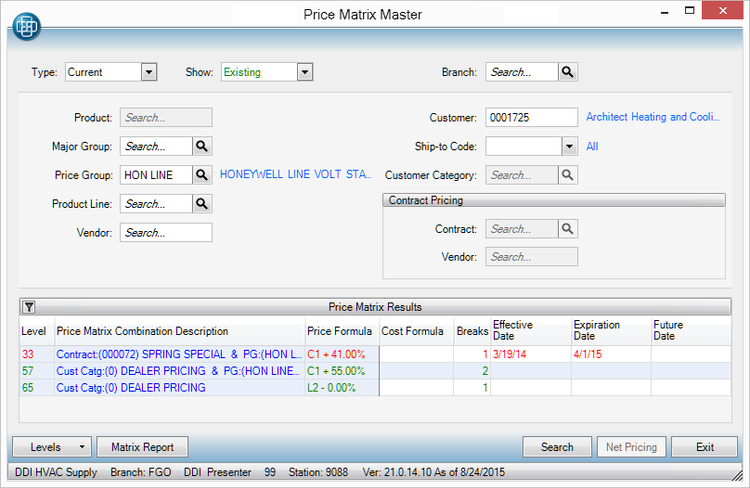
On-Premise ERP Pricing Guide
The average monthly cost for small businesses with $1 to $5 million in annual revenue is $1,740. Enterprises with over $100 million in revenue may see these costs escalate to $9,330 monthly. In total, these can range from $20,880 to $111,960, not including support, training, or implementation.
The implementation phase for on-premises ERP can be particularly costly, often double the annual software-related expenses. So, for a business investing $20,880 annually in its ERP, implementation costs could reach at least $42,000. This figure represents a one-time expense, including hardware setup, software customization, and initial user training.




































































